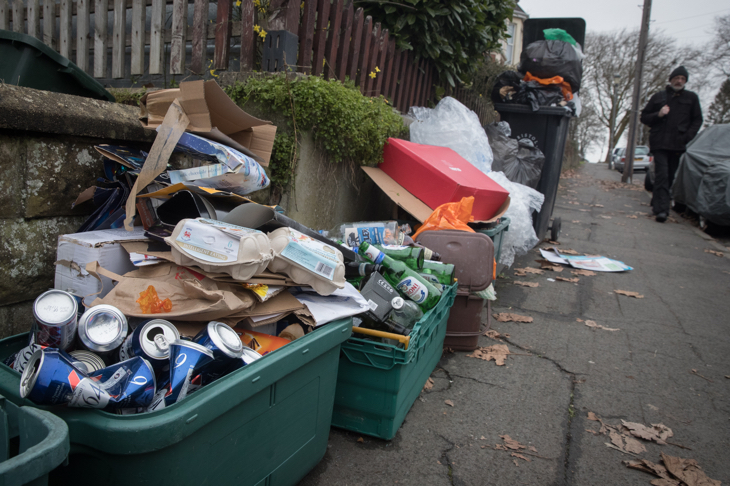‘I just want to say one word to you, just one word. Are you listening? Plastics.’ That iconic punch line from The Graduate, when a businessman gives Dustin Hoffman career advice at a cocktail party, has been circling my head ever since China announced that, as of 2018, it will no longer act as the West’s giant blue wheelie bin. Back in 1968, that businessman was righter than he could have known: ‘There’s a great future in plastics.’ We’re in that future — with dire consequences for aquatic life.
Let’s review: what is recycling for? To reduce landfill, whose toxins can leach into groundwater. To diminish litter. To create a circular manufacturing system, rather than constantly mining fresh raw materials — in order not only to prevent the exhaustion of natural resources, but to improve efficiency. Primarily, then, recycling is meant to decrease the amount of energy we expend on producing consumables. The energy saved should translate into less pollution and moderated global warming.
A successful recycling system is economically self-sustaining. Ideally, the re-use of materials is incentivised not merely by punitive laws, but by profit. Instinct dictates that it should be cheaper to repurpose glass, metals, paper, and plastic that are already glass, metals, paper, and plastic, rather than to mine more sand and ore, cut more trees, and extract more oil.
By that standard, we flunk. For I ask you: why should the UK plunge into such a crisis when suddenly unable to ship off tons of plastic waste to China, if Britain’s recycling is economically viable? (FYI, the previous schlepping of all that waste so far east would have been even more patently absurd in terms of energy efficiency, if it weren’t for the fact that ships full of imported products from China would otherwise go back practically empty — a devastating indictment of a one-way trade relationship.) If recycling adds up economically, then companies should be springing up all over the UK, eager to take advantage of a vast untapped market. And empty ships or no, it would still make more environmental sense to recycle at home.
I’ve not spent hours on the phone with specialists to investigate the economic feasibility of recycling plastic in the UK. I simply submit that a priori, given the scale of the demand, enterprising start-ups should be springing up all over the country if it were remotely doable to make money at it.
My bet is that it isn’t doable, because energy in Britain is too expensive. And what is a driving reason energy is so expensive? Because of successive governments’ renewable, low-carbon energy policies. The irony is comical. We can’t recycle in-house because we’re too obsessed with wind farms.
Look. I like recycling. I recycle like a motherfucker. Re-using finished materials not only seems to make industrial sense, but appeals on a moral and emotional level. The practice is especially chuffed-making for people like me. I may be an atheist, but culturally my very bones are Protestant. Thus I have a deep-seated distaste for waste — not for rubbish, but in the dictionary sense of ‘expending something carelessly, extravagantly, or to no purpose’. Many Brits my age were also raised with the same make-do-and-mend sensibility inherited from thrifty post-war parents.
Indeed, my own parents were early adopters, so that one of my chores in the early 1970s was to wash out containers for recycling every fortnight. A keen memory from adolescence is literally gagging over mayonnaise jars smeared with spoiled, reconstituting muck. (You’ve got to wonder why my parents couldn’t simply rinse those stupid jars when the mayo scrapings were still fresh — but my terrible tales of child abuse will wait for another column.)
Yet the warm and fuzzy feeling I get from tossing another empty bottle of Tesco Value sparkling water into our recycling basket in London is constantly undermined by a little voice in my head whispering that this exercise is a farce. Sure, I love imagining that I’m not really pitching all this ugly, poisonous polyethylene terephthalate into the universe, but participating in a sound, sustainable circle of virtue. But I’m lying to myself, and so are a lot of people.
Plenty of UK councils send a massive whack of their so-called recycling to landfill. Worse, from what I’ve read, whether recycling costs less or more energy than using raw materials is perched on a knife-edge. As a rule, only paper reliably requires less energy to recycle than to produce from scratch, and only paper recycling is consistently profitable — though not by much. For tin, aluminium, glass and plastic, it’s either a wash or a loss. Even rinsing containers at home, especially with hot water, will generally tip this entire self-congratulatory exercise into the worse-than-pointless. Yet nothing makes the middle class angrier than telling householders that their faithful filling of blue wheelie bins is the sacrament of a false religion.
I still fancy recycling as an idea, but in practice we need a massive rethink. I feel like an idiot tossing a wine bottle in our basket, when I know it will take ridiculous amounts of energy to melt its glass down. Why do we melt it down? Believe me, Shriver is bound to buy more wine. So why not sterilise it and fill it with more wine?
We don’t need to find another benighted country where we can mound our waste out of sight, the better to continue to kid ourselves. We don’t need a steep bottle deposit, so long as those bottles would still join a system that is economically and environmentally self-deceiving. We need to design standardised containers for our food and drink that themselves get re-used, like milk bottles of yore. Now, that was real recycling: you drank the milk, returned the container, and bought more milk in the same container.
This brand of thinking big needn’t be pie-in-the-sky. Why, even commercial pie in the sky could be baked in sturdy returnable aluminium pans, the better to bake more pie.


















